 | Can you believe that I once drank, aided and abetted by my wife, a bottle of single malt whisky valued at £22,000 (approx $40,000)!!!! In 1960 we were on honeymoon in Cornwall, staying at a hotel in Mullion Cove, when we decided to have a look around the town of Penzance. Wandering around the shops we came across a small grocery store and inside we found a bottle of single malt whisky. It was very expensive at £12.50, but what the hell we thought this was a special occasion so we bought it and carried our prize back to the hotel where over two to three days we drank it, enjoyed it and thought no more about it… until… Last year a single bottle of twenty year old Macallan fetched £20,000 in auction, this year a second bottle of twenty year old Macallan fetched £22,000 in auction. |
Thursday, 14 February 2008
Enjoying a wee dram...
Sunday, 27 January 2008
Bad Days
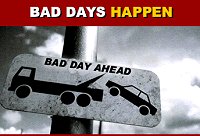 | Should you ever consider that you are having a bad day think on this: Norman (a showman friend) called last night, he's just returned from an intended several weeks in Spain - or at least until the money ran out. A few months back he and his aunt were burgled and their collection of Royal Dux figures were taken. The insurance company forked out £40k. |
Because his aunt didn't want to stay in the caravan that had been broken into he sold it and bought another. He also bought himself a BMW car and a 30' x 8' x 11' motorhome. Within days he crashed the BMW and thought he'd written it off, but the insurance said no and shelled out £10k to have it put back on the road.
Having had a solar panel fitted to the roof of the motorhome and a petrolyte gas tank fitted (petrol does 10 miles to the gallon, petrolyte gas 20 mpg), Norman set out for Spain. Once in Spain, having wiped out four wing-mirrors of other cars he topped it off by backing into a brand-new, latest model, sports car and reducing the back end to scrap metal. This was an irate owner and police job. Driving away, eventually, he wiped out yet another wing mirror, only this time the owner was on hand and gave chase. Prolonged negotiations took place.
Having by now run out of money, Norman headed for home. Driving via Bournemouth and Brighton he demolished yet more wing mirrors, a tree and several wheelie bins (garbage bins on wheels). He decided to visit friends in Stoke on Trent. In the Handsworth (Birmingham) area he fell asleep and sideswiped another car. The owner was a large, very large, black West Indian Rastafarian with attitude! This gentleman removed Norman's keys and wouldn't give them back until several 'guilty' statements had been made and indemnity given.
Norman proceeded to Stoke and on arriving at his friend's was surprised to see a neighbour rushing out waving her arms at him. On dismounting he too was alarmed to see smoke gushing from below the bonnet. Without hesitation he dived back into the motorhome and retrieved his valuables, including his clothes, just as the fire brigade arrived. The motorhome was a write-off.
Later, now driving his repaired BMW, he stopped at a cash point in Birmingham to get some money… he left the car unlocked! On his return he found his new leather jacket gone and the radio! He now has four insurance claims against him, plus his own claims for the motorhome and the car radio. What do you think of his chances of getting a reasonable insurance quote next time?
Thursday, 17 January 2008
A Small Boy Excited
Many friends loved the WW2 story of my childhood days and asked for more. I tried to explain that these were childhood memories where despite the murder and mayhem of the bombing raids to a child the most important things were the shortage of fruit and sweet rationing! Included here is a poem by my cousin, Peter, who lived about half a mile from where we lived, it does explain perfectly how the war affected a child and I couldn’t have put it better myself.
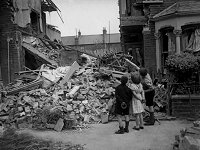 | A Small Boy Excited Mick slinks slyly into our shelter Recognise the Junkers, Heinkel or Dornier Silver paper enemy bombers shower Crump, crump a house has gone Tracer bullets past the window Shrapnel through the kitchen door Emerging dog shaking imaginary water With other boys and not a thought By Peter G Pigden (Aged 68 years) | |
One of my most exciting memories occurred one night when an incendiary bomb crashed through the glass of the veranda roof, landed on the concrete patio floor and DIDN’T EXPLODE! A visiting uncle on leave from the army threw himself on the floor yelling “DOWN EVERYBODY!” Grandad, stepped over him muttering “Get up you silly bugger, you’re frightening the kids.” Far from frightened we ‘kids’ (myself and my mate, Dennis) peered out from the steel table shelter built in the living room and watched in excited awe as Grandad opened the veranda doors, stepped out onto the patio and picked up the incendiary bomb. He then proceeded to WALK down the garden followed by yells of “For God’s sake run!” which he calmly ignored. At the bottom of the garden he dumped the bomb on the compost heap and tipped a fire bucket of sand over it. At that moment it exploded and set fire to absolutely nothing! Grandad returned completely unfussed and said to my mother “Isn’t it time you got the kettle on?”
I should add that whenever the sirens sounded, my mate Dennis was brought around and we were consigned to the table shelter, a place that we had very thoughtfully packed with goodies during the day – sweets, fruit from the garden and anything else we could lay our thieving hands on! The rest of the family simply sat around and chatted, played darts or cards and drank beer! A wonderful attitude to war.
Sunday, 6 January 2008
Poetry 12
 | The Fantasy of Reality There was a time, |
The Last Sabre Charge of the Yeomanry - 1917 Under the African sun | 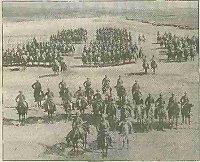 Worcestershire Yeomanry at Huj in the Sinai Desert at 1.30pm on 8th November 1917, just before the final British Cavalry Charge against guns |
Additional Information: For a personal recollection of the Cavalry Charge at Huj, by Corporal Darcy Jones of the Worcestershire Yeomanry, please click here. |
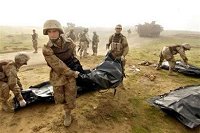 | The Economics of War “Send ten thousand men.” “Make sure you’ve got the body bags To bring them back again.” |
The end of the beginning Somewhere there was a beginning, |  |
 | Unspoken The loneliness of one |
Shadows Night, when all the shadows |  |
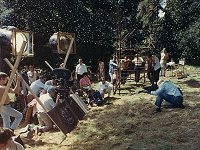 | Brute force Brutes blare their artificial suns, |
Silence There is silence, |  |
Saturday, 29 December 2007
The Story of Piglet and Kanga
During my three years at the University of Warwick there were many happy milestones to mark that particular journey, but by far the most memorable for me was the night I read a bedtime story. Two attractive and nubile young ladies, all of nineteen years of age, (I was 45) were tucked up in their beds in their shared on campus accommodation. Both clutched their favourite teddies. One I recall named ‘Gorgeous’. | 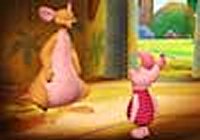 |
I was there by invitation and sat on one of the beds. I began reading the story of Piglet & Kanga from Winnie the Pooh. I haven’t had a more attentive audience since I read stories to my own children. As I turned the last page it came to my attention that I had ‘lost’ my audience – they were both fast asleep. I closed the book, crept out softly, closed the door and revelled in the sheer magic of a moment I was privileged to share and have never forgotten. |
Friday, 21 December 2007
Mountain Men
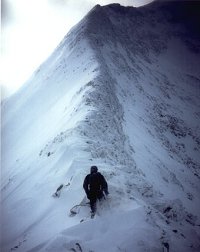 | A large greystone barn tucked away in a glen beneath Ben Nevis. A muddy, swollen river swirls silently alongside. Beneath the hayloft of the barn a long, narrow stable, the walls glistening with damp and condensation. A pressurised paraffin cooker roars like a jet engine on test, but emits a penetrating warmth and pleasant vapours that seduces the mind into a cosy, nostalgic mood. A rheumy-eyed carthorse watches sleepily from his manger at the end of the stable, grateful perhaps for the pleasant warmth on such a cold night. The talk is muted, broken occasionally by bursts of laughter. Now and then a figure will fetch another bottle of beer, or fry a tasty omelette sandwich, filling the stable with delicious smells of eggs, bacon, onion and cheese. |
The talk rarely varied, always of tricky arêtes, corries, abseiling, glissading, taking shufti's on 'The Ben', dangerous climbs, beautiful climbs, names like Johnny Lees, John Brown, Hamish McInnis, of equipment, grampons, pitons, tragsitz, vibrams, nails, duvets and cagoules, of haufing, belaying, traversing and, just occasionally in a lighter vein, the 'birds' in the 'Fort' (girls in Fort William). Thus I sat, a privileged interloper, in an entirely new world where even the language was foreign, The world of mountain men, specifically the world of the RAF Kinloss mountain rescue team. There were nine RAF teams in all, six in Britain based at Kinloss, Morayshire; Leuchars, Fife; Leeming, Yorkshire; Valley, Anglesey; Stafford, Staffordshire; St Athen, Glamorganshire. Abroad there are three teams based at Aden, Hong Kong and Cyprus. Every man is a volunteer and performs his rescue duties apart from his normal job on the station. Although being a team member carries certain privileges and prestige the applicants are few and those who stay the course even fewer. A special breed of man is required to survive as a member. There is no pay for this job, the training courses are the toughest and most rigorous that could be devised and the members are expected to surrender every moment of their leave and spare time. Add to that the fact that the team is required to work in the filthiest weathers and that danger and death are constant companions one appreciates the smallness of the rewards. For two weeks over the Christmas period when the men would normally be on leave and home with their families the teams are on standby duty at their respective base camps, like Cameron's barn in Glen Nevis. Here they live as they do every weekend, training, eating, sleeping and ever ready for the almost inevitable call-out. The Christmas period seems to have a priority on accidents and fatalities. Due, it seems, mainly to two direct circumstances: University students are on holiday and are particularly prone to adopting the wildest climbing schemes. Linked with their lack of experience and lack of equipment the result is inevitably fatal. Secondly, every climb is graded from moderate to hard-severe and serious climbers must - to achieve experience and fulfillment - make those climbs in both summer and winter conditions. Despite their experience and preparedness all too frequently they are not conversant with the special hazards of the weather on the Scottish mountains weather that can change from gentle sunshine to raging blizzard within minutes, where exposure can kill in a matter of hours if a single false step doesn't kill you first. In bad weather on a mountain the choice is not a happy one - if you stay still you will die from exposure yet frequently you cannot see the next step in front of you and death is only a step away. Finally there is the utterly stupid climber who, like all good mountain men, leaves a note in the specially positioned boxes of exactly where he is going and his starting time and date, then halfway up change his mind and goes somewhere else. Injured or lost it may take the rescue teams as long as three weeks to find his body, simply because of his own misleading directions. In the main these are the general reasons for accidents on the mountains, but there are always the odd cases like the two drunks rescued from the top of Ben Nevis by the Kinlos team on New Years Eve. Both were very happy and singing loudly unknowing and uncaring that by morning they would have been dead from exposure. The Kinloss team, not to detract from the hazards faced by other teams, covers a particularly dangerous area reaching across the Scottish highlands from the Moray Firth to Skye and Strathy point to the North Western Cairngorms. The area includes some of the most hazardous climbs anywhere in the world, including Britain's highest peak, Ben Nevis and the snow covered slopes of the Cairngorms. The qualifications needed to enjoy these masochistic pleasures are few but stringent. A level head, a strong physique and above all a constant gnawing need to climb. 'Because it was there' is not a joke, it is deadly serious. Although the teams were formed as recently as 1942 they already have their legendary figures, like Sqd/Ldr Dave Dattner who led the Kinloss team. A man of tremendous charm, personality and courage. A man who insisted that every team member should be able to stitch open wounds and took a masochistic pleasure in slashing himself with a knife and making the members sew him up. Sqd/Ldr. Dattner, Sgt. Johnny Lees, C/T John Hines, it is men like these that have made the R.A.F. MRTs the smooth, efficient and tough units they are today. On a rescue when life is at stake the safety margin that allows for error is pushed to its very limits and the team must work as one man, their lives as well as the victims depend on their sped and skill. It is to their credit that despite the fantastic numbers of rescues that they have carried out they have only ever lost one man. Some would say that that was one too many, but they are usually the ones who have never been out with a mountain rescue team. The men themselves are curious in the odd mixture of intellects and temperaments, ranging across the full academic and social scene, frequently they meet on only one common ground, climbing, sufficient however to depend on each other for their lives. Their clothes and gear are always a mixture of RAF issue and any expensive personal items like duvets (quilted jackets) not issued by the RAF. The RAF equipment is sufficient - just. But when their comfort and lives depend on their equipment they prefer the best available, dipping deep into their own pockets to provide it. Hats are prized possessions; old, dirty, battered, ranging from Andy Cap's to deerstalkers. Local dances at Fort William or Kinlochleven are no longer surprised by the entrance of a couple of dozen men wearing heavy climbing boots, brightly coloured duvets, seaboot socks, scruffy sweaters and the hilarious hats. Local reaction is mixed with respect and gratitude from the middle and elder aged groups and resentment by the young males who too often lose girlfriends to team members. Very rarely is the resentment placed on a physical basis - on or off the hill the team is still a team, sufficient deterrent to anyone who has seen this tough, roughly shod, unit in action. Even as each man is different to his team mate thy are different within themselves. They work hard and with death as a constant reminder their play is that much more intense. These same men who would fight at the drop of a hat (probably for it) will tear their guts out to reach an injured man on the mountain. Conversely they will be as gentle as a lamb with a new member on the hill for the first time. Always keeping the pace down to that of the slowest without the slightest show of irritation or impatience, yet stupidity or irresponsibility on the mountain can earn you a ducking in the Loch or expulsion from the team. Expulsion is determined by the team, they simply refuse to go out with anyone they consider a liability. One eccentricity of the teams infrequent leisure is trophy hunting, this constitutes a major pastime. If it isn't embedded in concrete the team will remove it. The prize example is a rather grand, but tatty elephant's skull outside the natural history museum at Forres. This has disappeared so frequently that a rather bored curator now simply telephones RAF Kinloss and asks "Please may we have our head back." whereupon it is duly returned until the following weekend. The Daily Mail once ran a publicity stunt by having a man photographed selling their newspaper on top of Ben Nevis with a large Daily Mail banner in the background. They lost the banner, it adorns a wall in the Kinloss briefing hut. Their play is exuberant but harmless, their work dangerous but lifesaving. Every February the teams gather from all over the world to meet on Ben Nevis for the annual winter training courses in snow and ice climbing. Dedicated men gaining every ounce of skill and experience to make them more efficient at saving lives. Sitting in the warmth of Cameron's barn on Christmas night I asked the team why they preferred being here to being with their relatives and friends. The reply was unanimous - 'This is living, not sitting around sipping drinks with relatives I hardly know and playing musical chairs, besides – my mates are here.' Frederick Covins (1964) |
Monday, 10 December 2007
The Long Walk
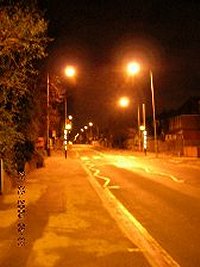 | The wet, garishly lit streets held a warmth and friendliness that, momentarily, relieved his sense of impending doom. Mordan, he knew, would be waiting for him, lurking in mortal guise, ready to pounce and sink his deadly talons into his soft flesh. He watched the pale faces of the hurrying crowds, listened to their inconsequential chatter and the hiss of car tyres on the wet road; warm comforting sounds that helped to quell his rising fear. The crowds were beginning to thin out it was time to go. Hunching his wiry shoulders beneath the thin raincoat and narrowing his eyes into sharp, alert slits he set out on the long walk to his headquarters. |
Where, he wondered, would Mordan strike? Here, in the crowded street? Or would he wait until he, the tightly wound agent, passed into the lonely darkness of Potters Road? The crowds, he noted, had entirely disappeared now; all safely behind their bolted doors he thought bitterly. With unfaltering step he sauntered into the deserted suburban street. Behind the sharp eyes and deceptively casual movements his heart hammered like a bass drum. A cat, black, sleek and shiny-eyed, leapt from the shadow of a privet hedge; his heart did a peculiar little flip and nearly stopped. Despite his outward calm, the fear grew and his pace quickened. It took a conscious effort to slow himself down; he must not let that evil monster see that he was afraid. He tried to whistle a casual tune, but his lips were dry and all he could manage was a nervous, tuneless, blowing of air. Deliberately, he veered outwards until he was walking in the centre of the road and as far as he could get from the dark, menacing shadows of the pavements. Here at least he would have some warning of Mordan’s attack. Only a few more yards to go. A dog growled softly and the hair prickled on the back of his neck. Like a blinding flash the thought exploded in his mind! The dog! Mordan’s devilish hound! Despite himself his legs broke into a run, with practiced ease he vaulted the low wall and dashed up the narrow pathway. His back slammed against the panelled door as he turned to face the darkness and his vile enemy. His fist rapped out the signal with frantic urgency. The measured footsteps beyond the door seemed to take an eternity. Suddenly the door gave against his pressure and light, warm, safe, light flooded across his swiftly composed features. “Hello,” said his mother, “Good film was it?” |
